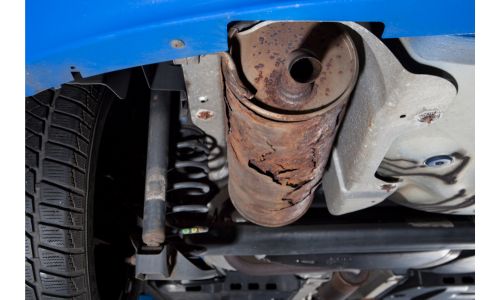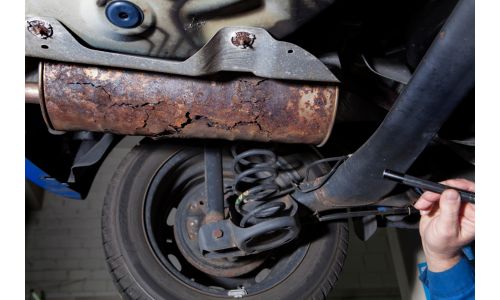The exhaust pipe is vulnerable to hosting rust very easily. It not only damages the exhaust system or the vehicle but also triggers a decline in the vehicle’s lifespan. This context demands a critical level of attention to restrict rust occurrence on the exhaust pipe.
So, why does the exhaust pipe rust faster? The primary reasons are heat and water vapor condensation. Also, there are some other reasons, like a damaged O2 sensor, faulty head gasket, damaged muffler, blocked catalytic converter, and cracked engine block.
This can be solved by replacing the faulty parts, cleaning the clogged components, and finally, replacement of the rusty exhaust pipe.
In this article, we detail the reasons to provide you with an in-depth understanding of this rusting context. We also inform you of effective solutions to deal with the exhaust-rust issue.
Is It Normal For Exhaust Pipes To Rust?
Yes, it is very normal that the exhaust pipe receives rust over time. Even if the earlier-mentioned mechanical components are not damaged or functioning properly, the pipe will get rusty.
The exhaust pipe is made of metal like iron or steel, which is subjected to corroding by their natural characteristics. In this case, accommodating higher temperatures, burning of road salt, and moisture accumulation welcome such occurrences.
As I mentioned before, this can happen over time as regular wear. But if the exhaust pipe rusts faster, there are noticeable underlying reasons behind it.

Why Are Exhaust Systems Prone To Rust?
Exhaust pipes’ materials are the first reason why they are prone to rust. The exhaust pipes are generally made of ferrous alloys, which include cast iron and steel alloys.
These materials are naturally prone to rust over time. The pipes go under extreme weather pressure, thermal cycles, and stress. They also come into contact with harmful gasses and environmental substances.
All these make the entire entire exhaust system prone to rust.
How The Exhaust Pipe Rust? The Common Reasons
At present, many manufacturers use stainless steel to produce exhaust pipes. But, these also cannot restrict receiving rust on their bodies. Still, stainless steel-made exhaust pipes are more effective than iron or steel-made exhaust pipes in terms of preventing rust’s inclusion.
By the way, the exhaust system rusts due to various reasons. The reasons are as follows.
Moisture Condensation and Contact with Toxic Gasses
After the vehicle’s engine stops, the exhaust pipe cools down very first. This rapid decline in temperature drags moisture from the outside air. And water content accumulation occurs in a gaseous state.
Then condensation takes place, transposing the gaseous water content to liquid water content. Upon contact between the pipe surface and water, it supports the orientation of rust in the form of metal oxide.
The exhaust system also releases toxic gasses like sulfur dioxides, nitrogen oxides, etc., as soon as the engine is started. Chemical reactions take place between toxic gasses and moisture content under a heated condition, which boosts rust’s occurrence.
Accommodating Moisture Content
The exhaust pipe accommodates moisture from the air and the exhaust gasses. And this moisture accumulation gets condensation due to fluctuations in temperature, promoting rust’s orientation.
Hosting Road Salts
Road salts like sodium chloride (NaCl) or calcium chloride (CaCl2) are imposed by the municipality to melt ice and snow on roads during winter. After the salt melts the snow, many ions receive a free-floating state.
When the vehicle passes the respective water depositories, these ions contact the exhaust pipe’s metal body. These free-float ions react with the pipe’s metal and form iron oxide. Hence, rusting of the exhaust pipe starts.
Bad Driving Habits
Frequent braking and stop-and-go obstruct the exhaust system to reach its functional operating temperatures. This results in incomplete moisture evaporation, and the accumulated water contributes to rust formation.
Faulty Mechanical Components
Fault in any mechanical component, like an oxygen sensor, head gasket, muffler, etc., also triggers rust’s occurrence.

How To Remove Rust From The Exhaust Pipe?
Below is a stepwise guide to removing rust both outside and inside of an exhaust pipe:
- Step 01: Place the vehicle on the under-vehicle inspection platform.
- Step 02: Wear protective goggles, helmet, and gloves. And go underneath the car.
- Step 03: Use a rubber-coated chipping hammer to remove the loose rust. Just gently hit the hammer to the pipe body.
- Step 04: Now, take the wire brush and rub the corroded spaces on the exhaust pipe.
- Step 05: Spray the rust removal substance like D40 on the respective areas. Use dry and clean cloth pieces to wipe up the dissolved rust. You can also use white vinegar if you cannot arrange rust spray.
- Step 06: Tie a dry rug with a stick and rub the inner surface of the pipe.
- Step 07: Now, take a long handle wire brush and clean the inside pipe rust. Do not use any watery substances, as that can make the rusty scenario worse.
- Step 08: Check the overall condition. If any rusty part is left or there are some stubborn rusts, start from step 03.
Check out this YouTube video to learn more:
Should I Repair Or Replace A Rusty Exhaust Pipe?
To decide on repairing or replacing a rusty exhaust pipe, we suggest you consider two factors.
- If the rust-affected portion is very little, go for repair work. But, if the whole system is rusty and you can see there is a huge possibility of the orientation of holes, go for replacement.
- If the pipe is a little rusty, but the system’s core components are worn out, it is better to get a new pipe along with the whole exhaust system.
How To Prevent Exhaust From Rusting?
Prevention is better than cure, and this word is universal. So, why should you let your exhaust pipe rust if you can prevent them effectively? Let’s see how you can prevent rust on your vehicle’s exhaust pipe and give them a longer lifespan.
- Always use a stainless steel-made exhaust pipe.
- Go for high-temperature paint or powder coating to prevent the orientation of rust.
- Do scheduled cleaning of the pipe. Take special care of the joints, nuts, and bolts, as these can easily host rust and support its spreading.
- Practice responsible driving habits. Do not leave the vehicle ideal for a longer time. Also, avoid sudden stops and acceleration, as these trigger temperature fluctuations.
- Do not drive through deep water and park the vehicle in a dry environment.
Conclusion
We expect that the detailing on why the exhaust pipe rusts faster has made you understand the whole scenario. The exhaust system’s exposure to extreme temperature fluctuations, corrosive gasses, moisture accumulation, etc., supports rapid rust formation.
You can get rid of the rust by employing the rust-removal method elaborated above. However, we prioritize regular pipe cleaning and using a high-quality exhaust system significantly to prevent rust’s orientation. Also, the replacement of rusty pipes demands effort and money. So, try your best to avoid the replacement of the exhaust pipe.

